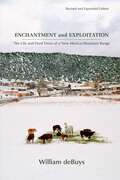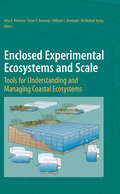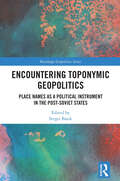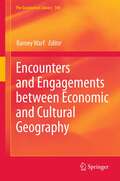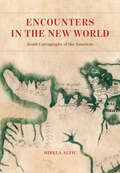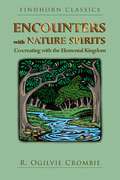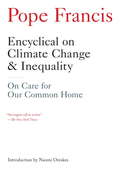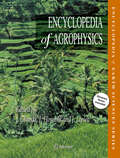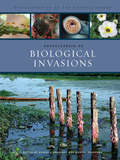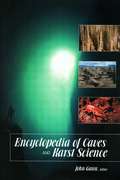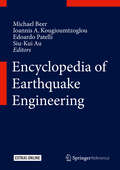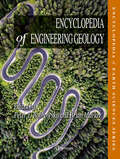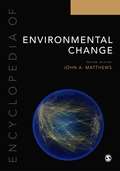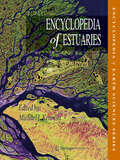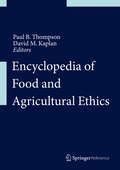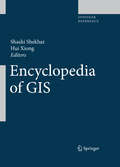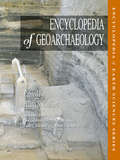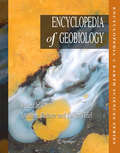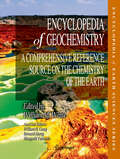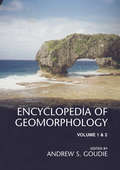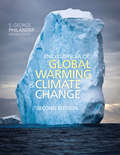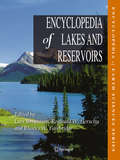- Table View
- List View
Enchantment and Exploitation: The Life and Hard Times of a New Mexico Mountain Range, Revised and Expanded Edition
by William deBuysFirst published in 1985, William deBuys&’s Enchantment and Exploitation has become a New Mexico classic. It offers a complete account of the relationship between society and environment in the Sangre de Cristo Mountains of northern New Mexico, a region unique in its rich combination of ecological and cultural diversity. Now, more than thirty years later, this revised and expanded edition provides a long-awaited assessment of the quality of the journey that New Mexican society has traveled in that time—and continues to travel.In a new final chapter deBuys examines ongoing transformations in the mountains&’ natural systems—including, most notably, developments related to wildfires—with significant implications for both the land and the people who depend on it. As the climate absorbs the effects of an industrial society, deBuys argues, we can no longer expect the environmental future to be a reiteration of the environmental past.
Enclosed Experimental Ecosystems and Scale
by W. Michael Kemp John E. Petersen William C. Dennison Victor S. KennedyEnclosed ecosystem experiments have gained in popularity as research tools in ecological science, particularly in the study of coastal aquatic environments. These systems provide scientists with a degree of experimental control that is not achievable through field experiments. Yet to date, techniques for systematically extrapolating results from small-scale experimental ecosystems to larger, deeper, more open, more biologically diverse, and more heterogeneous ecosystems in nature have not been well developed. Likewise, researchers have lacked methods for comparing and extrapolating information among natural ecosystems that differ in scale. Enclosed Experimental Ecosystems and Scale: Tools for Understanding and Managing Coastal Ecosystems provides scientists, managers, and policy makers with an introduction to what has been termed the "problem of scale", and presents information that will allow for improved design and interpretation of enclosed experimental aquatic ecosystems. The book integrates the results of a 10-year research project involving a multi-disciplinary team of scientists and students to explore scale-related questions in a variety of coastal habitats. Anticipating use as a reference, the book has been designed so that individual sections and individual pages can function as stand alone units.
Encountering Toponymic Geopolitics: Place Names as a Political Instrument in the Post-Soviet States (Routledge Geopolitics Series)
by Sergei BasikThis book provides cutting-edge insights on contemporary geopolitical toponymic policy and practice in post-Soviet countries. It examines the political features of place naming as a reflection of contemporary political discourse. With multidisciplinary insights from leading scholars, chapters explore a range of topics drawing on critical political toponymy and traditional methods. Contributions examine how the toponymic system can act as a symbol of national identity, the regional geopolitics of toponymy, and geopolitical patterns in contemporary renaming. The historical roots of toponymic decolonization are analyzed, as well as indigenous toponymy and politics, and toponymic aspects of people's daily lives. The book explores a wide range of processes in the post-Soviet realm, including power, identity, economy, social order, and how political power is changing/transforming. It considers how these processes are distributed through various geopolitical and political-economic technologies. Offering empirically rich research from a variety of regions to give insights beyond "Western" perspectives, this book is the first to provide an in-depth exploration of post-Soviet place naming. It will appeal to students and researchers in human geography, politics, sociology, Eastern European studies, onomastics and cultural studies.
Encounters With The Archdruid
by John McpheeThe narratives in this book are of journeys made in three wildernesses - on a coastal island, in a Western mountain range, and on the Colorado River in the Grand Canyon. The four men portrayed here have different relationships to their environment, and they encounter each other on mountain trails, in forests and rapids, sometimes with reserve, sometimes with friendliness, sometimes fighting hard across a philosophical divide.
Encounters and Engagements between Economic and Cultural Geography
by Barney WarfThe intellectual renaissance of human geography has included a widespread engagement between its economic and cultural subdisciplines. This volume adopts a variety of conceptual and empirical perspectives on the encounters between economic and cultural geographers. It offers an introduction and 10 chapters by authors in a variety of national contexts to explicate issues such as the cultural turn in economic geography, the cultural construction of economic geographic thought, consumption, gender, everyday life, commodity chain analysis, trust, networks, the creative economy, and tourism. The volume contains empirical analyses utilizing both quantitative and qualitative approaches at spatial scales ranging from the individual to the global economy. In illustrating how human geographers can ill afford to subscribe to the analytically false dichotomy between "culture" and "the economy," the book explicates how cultural and economic geography can be seamlessly integrated , bringing them into a creative tension to their mutual benefit.
Encounters in the New World: Jesuit Cartography of the Americas
by Mirela AlticAnalyzing more than 150 historical maps, this book traces the Jesuits’ significant contributions to mapping and mapmaking from their arrival in the New World. In 1540, in the wake of the tumult brought on by the Protestant Reformation, Saint Ignatius of Loyola founded the Society of Jesus, also known as the Jesuits. The Society’s goal was to revitalize the faith of Catholics and to evangelize to non-Catholics through charity, education, and missionary work. By the end of the century, Jesuit missionaries were sent all over the world, including to South America. In addition to performing missionary and humanitarian work, Jesuits also served as cartographers and explorers under the auspices of the Spanish, Portuguese, and French crowns as they ventured into remote areas to find and evangelize to native populations. In Encounters in the New World, Mirela Altic analyzes more than 150 of their maps, most of which have never previously been published. She traces the Jesuit contribution to mapping and mapmaking from their arrival in the New World into the post-suppression period, placing it in the context of their worldwide undertakings in the fields of science and art. Altic’s analysis also shows the incorporation of indigenous knowledge into the Jesuit maps, effectively making them an expression of cross-cultural communication—even as they were tools of colonial expansion. This ambiguity, she reveals, reflects the complex relationship between missions, knowledge, and empire. Far more than just a physical survey of unknown space, Jesuit mapping of the New World was in fact the most important link to enable an exchange of ideas and cultural concepts between the Old World and the New.
Encounters in the New World: Jesuit Cartography of the Americas
by Mirela AlticAnalyzing more than 150 historical maps, this book traces the Jesuits’ significant contributions to mapping and mapmaking from their arrival in the New World. In 1540, in the wake of the tumult brought on by the Protestant Reformation, Saint Ignatius of Loyola founded the Society of Jesus, also known as the Jesuits. The Society’s goal was to revitalize the faith of Catholics and to evangelize to non-Catholics through charity, education, and missionary work. By the end of the century, Jesuit missionaries were sent all over the world, including to South America. In addition to performing missionary and humanitarian work, Jesuits also served as cartographers and explorers under the auspices of the Spanish, Portuguese, and French crowns as they ventured into remote areas to find and evangelize to native populations. In Encounters in the New World, Mirela Altic analyzes more than 150 of their maps, most of which have never previously been published. She traces the Jesuit contribution to mapping and mapmaking from their arrival in the New World into the post-suppression period, placing it in the context of their worldwide undertakings in the fields of science and art. Altic’s analysis also shows the incorporation of indigenous knowledge into the Jesuit maps, effectively making them an expression of cross-cultural communication—even as they were tools of colonial expansion. This ambiguity, she reveals, reflects the complex relationship between missions, knowledge, and empire. Far more than just a physical survey of unknown space, Jesuit mapping of the New World was in fact the most important link to enable an exchange of ideas and cultural concepts between the Old World and the New.
Encounters with Florida's Endangered Wildlife
by Doug AldersonEastern bison roamed Florida into the 1800s. Red wolves disappeared in the 1920s. The dusky seaside sparrow was declared extinct in 1990.It's too soon to say whether the 116 threatened, endangered, or imperiled animal species currently found in the state will also fall victim to climate change, extermination, overdevelopment, or poisons. But as long as they remain, there will be men and women who work tirelessly on their behalf.Combining adventure, natural history, and cultural history, Encounters with Florida’s Endangered Wildlife features chapters tracking panthers, black bears, whooping cranes, manatees, sea turtles, even ivory-billed woodpeckers--which may or may not be extinct. Join Doug Alderson as he travels into prairies, woods, springs, and ocean to come face to face with these and other captivating creatures and learns firsthand about their strangled lives and fragile habitats.With a chapter on the impact of non-native populations of Burmese pythons and Rhesus monkeys, as well as a chilling epilogue that imagines the peninsula one hundred years in the future, this book is a must-read for anyone who wants to know more about the current state of wild Florida.
Encounters with Nature Spirits: Co-creating with the Elemental Kingdom
by R. Ogilvie CrombieA fascinating, first-hand account of the vast powers and true nature of the Elemental Kingdom • Reveals deep wisdom, eloquently shared through the author’s encounters with the great God Pan and his elemental subjects • Offers a glimpse into the hidden layers of the natural world and the workings of the elemental kingdom • Includes chapters by Mike Scott, David Spangler, Dorothy Maclean, and Brian Nobbs as well as beautiful illustrations by fine artist Elise Hurst, who perfectly captures the energy of the natural world and its subjects as we might perceive them “To anyone who may have expressed a wish to see and talk to nature spirits . . . remember it took 63 years for my wish to be granted, so don’t lose hope.” Have you ever wished for something with your whole heart? As a child, R. Ogilvie Crombie (Roc) made a wish as he dropped a penny into a wishing well - he asked to be able to see fairies and talk to them. In Encounters with Nature Spirits, we follow Roc’s path as, many years later, he meets the faun Kurmos in the Royal Botanic Garden in Edinburgh, discovers the realm of the elementals, and, eventually, meets the great god Pan himself. In his conversations with Pan, elves, and other nature spirits Roc realizes that the elemental realm is vastly more powerful than our human kingdom and possesses an ability to create far beyond our human means. Through his experiences Roc becomes closely involved with the Findhorn Community in northeast Scotland where he meets further elementals who give him sound advice as to how the famous Findhorn gardens should be cared for in order to work in harmony with nature. Encounters with Nature Spirits is a reminder to us all of the importance of our relationship with the nature kingdom. Through his example, Roc places emphasis on connecting and working in harmony with nature spirits. True co-creation with nature, working with rather than against the elemental kingdom, can bring about vital positive change to our endangered eco-system. The elementals are open to working with mankind--the question is, are we humans open to engaging with and respecting them again?
Encyclical on Climate Change and Inequality
by Pope Francis Naomi OreskesThe complete text of the landmark encyclical letter from Pope Francis that, as Time magazine reported, "rocked the international community"In the Encyclical on Climate Change and Inequality, the beloved Pope exhorts the world to combat environmental degradation and its impact on the poor. In a stirring, clarion call that is not merely aimed at Catholic readers but rather at a wide, lay audience, the Pope cites the overwhelming scientific evidence of climate change, and does not hesitate to detail how it is the result of a historic level of unequal distribution of wealth.It is, in short, as the New York Times labeled it, "An urgent call to action . . . intended to persuade followers around the world to change their behavior, in hopes of protecting a fragile planet." With an insightful and informative introduction by Harvard professor Naomi Oreskes, famed for her bestselling Merchants of Doubt: How a Handful of Scientists Obscured the Truth on Issues from Tobacco Smoke to Global Warming.From the Trade Paperback edition.
Encyclopedia of Agrophysics
by Charles W. Finkl Rainer Horn Eugene V. Shein Jan Gliński Jerzy Lipiec Josse De Baerdemaeker Józef Horabik Krystyna Konstankiewicz Stanislaw Grundas Winfried E. Blum Yakov PachepskyThis Encyclopedia of Agrophysics will provide up-to-date information on the physical properties and processes affecting the quality of the environment and plant production. It will be a "first-up" volume which will nicely complement the recently published Encyclopedia of Soil Science, (November 2007) which was published in the same series. In a single authoritative volume a collection of about 250 informative articles and ca 400 glossary terms covering all aspects of agrophysics will be presented. The authors will be renowned specialists in various aspects in agrophysics from a wide variety of countries. Agrophysics is important both for research and practical use not only in agriculture, but also in areas like environmental science, land reclamation, food processing etc. Agrophysics is a relatively new interdisciplinary field closely related to Agrochemistry, Agrobiology, Agroclimatology and Agroecology. Nowadays it has been fully accepted as an agricultural and environmental discipline. As such this Encyclopedia volume will be an indispensable working tool for scientists and practitioners from different disciplines, like agriculture, soil science, geosciences, environmental science, geography, and engineering.
Encyclopedia of Biological Invasions
by Daniel Simberloff Marcel RejmanekThis pioneering encyclopedia illuminates a topic at the forefront of global ecology--biological invasions, or organisms that come to live in the wrong place. Written by leading scientists from around the world, Encyclopedia of Biological Invasions addresses all aspects of this subject at a global level--including invasions by animals, plants, fungi, and bacteria--in succinct, alphabetically arranged articles. Scientifically uncompromising, yet clearly written and free of jargon, the volume encompasses fields of study including biology, demography, geography, ecology, evolution, sociology, and natural history. Featuring many cross-references, suggestions for further reading, illustrations, an appendix of the world's worst 100 invasive species, a glossary, and more, this is an essential reference for anyone who needs up-to-date information on this important topic. Encyclopedia of Biological Invasions features articles on: * Well-known invasive species such the zebra mussel, chestnut blight, cheatgrass, gypsy moth, Nile perch, giant African snail, and Norway rat * Regions with especially large numbers of introduced species including the Great Lakes, Mediterranean Sea, Hawaiian Islands, Australia, and New Zealand. * Conservation, ecological, economic, and human and animal health impacts of invasions around the world * The processes and pathways involved in invasion * Management of introduced species
Encyclopedia of Caves and Karst Science
by John GunnThe Encyclopedia of Caves and Karst Science contains 350 alphabetically arranged entries. The topics include cave and karst geoscience, cave archaeology and human use of caves, art in caves, hydrology and groundwater, cave and karst history, and conservation and management. The Encyclopedia is extensively illustrated with photographs, maps, diagrams, and tables, and has thematic content lists and a comprehensive index to facilitate searching and browsing.
Encyclopedia of Earthquake Engineering
by Michael Beer Siu-Kui Au Ioannis A. Kougioumtzoglou Edoardo PatelliThe Encyclopedia of Earthquake Engineering is designed to be the authoritative and comprehensive reference covering all major aspects of the science of earthquake engineering, specifically focusing on the interaction between earthquakes and infrastructure. The encyclopedia comprises approximately 300 contributions. Since earthquake engineering deals with the interaction between earthquake disturbances and the built infrastructure, the emphasis is on basic design processes important to both non-specialists and engineers so that readers become suitably well informed without needing to deal with the details of specialist understanding. The encyclopedia's content provides technically-inclined and informed readers about the ways in which earthquakes can affect our infrastructure and how engineers would go about designing against, mitigating and remediating these effects. The coverage ranges from buildings, foundations, underground construction, lifelines and bridges, roads, embankments and slopes. The encyclopedia also aims to provide cross-disciplinary and cross-domain information to domain-experts. This is the first single reference encyclopedia of this breadth and scope that brings together the science, engineering and technological aspects of earthquakes and structures.
Encyclopedia of Engineering Geology (Encyclopedia Of Earth Sciences Ser.)
by Peter T. Bobrowsky Claudio Margottini Paul Marinos Brian Marker Martin G. Culshaw Jerome De Graff Laurance Donnelly Michael Hendry Jeffrey R. Keaton Victor Osipov Abdul Shakoor Roy ShlemonThis volume addresses the multi-disciplinary topic of engineering geology and the environment, one of the fastest growing, most relevant and applied fields of research and study within the geosciences. It covers the fundamentals of geology and engineering where the two fields overlap and, in addition, highlights specialized topics that address principles, concepts and paradigms of the discipline, including operational terms, materials, tools, techniques and methods as well as processes, procedures and implications.A number of well known and respected international experts contributed to this authoritative volume, thereby ensuring proper geographic representation, professional credibility and reliability. This superb volume provides a dependable and ready source of information on approximately 300 topical entries relevant to all aspects of engineering geology. Extensive illustrations, figures, images, tables and detailed bibliographic citations ensure that the comprehensively defined contributions are broadly and clearly explained.The Encyclopedia of Engineering Geology provides a ready source of reference for several fields of study and practice including civil engineers, geologists, physical geographers, architects, hazards specialists, hydrologists, geotechnicians, geophysicists, geomorphologists, planners, resource explorers, and many others. As a key library reference, this book is an essential technical source for undergraduate and graduate students in their research. Teachers/professors can rely on it as the final authority and the first source of reference on engineering geology related studies as it provides an exceptional resource to train and educate the next generation of practitioners.
Encyclopedia of Environmental Change: Three Volume Set
by John A MatthewsAccessibly written by a team of international authors, the Encyclopedia of Environmental Change provides a gateway to the complex facts, concepts, techniques, methodology and philosophy of environmental change. This three-volume set illustrates and examines topics within this dynamic and rapidly changing interdisciplinary field. The encyclopedia includes all of the following aspects of environmental change: Diverse evidence of environmental change, including climate change and changes on land and in the oceans Underlying natural and anthropogenic causes and mechanisms Wide-ranging local, regional and global impacts from the polar regions to the tropics Responses of geo-ecosystems and human-environmental systems in the face of past, present and future environmental change Approaches, methodologies and techniques used for reconstructing, dating, monitoring, modelling, projecting and predicting change Social, economic and political dimensions of environmental issues, environmental conservation and management and environmental policy Over 4,000 entries explore the following key themes and more: Conservation Demographic change Environmental management Environmental policy Environmental security Food security Glaciation Green Revolution Human impact on environment Industrialization Landuse change Military impacts on environment Mining and mining impacts Nuclear energy Pollution Renewable resources Solar energy Sustainability Tourism Trade Water resources Water security Wildlife conservation The comprehensive coverage of terminology includes layers of entries ranging from one-line definitions to short essays, making this an invaluable companion for any student of physical geography, environmental geography or environmental sciences.
Encyclopedia of Estuaries
by Michael J. KennishThe Encyclopedia of Estuaries, part of Springer's Encyclopedia of Earth Sciences Series, provides a single, state-of-the-art, comprehensive reference volume on estuaries for research scientists, educators, students, and others. Consisting of hundreds of subject entries in an easy-to-use format, this volume covers the physical, chemical, and biological characteristics of estuaries. Authors from around the world have contributed to the encyclopedia on such diverse subjects as biotic communities, essential habitats, food webs, fisheries, hydrology, pollution, conservation, and many more. The Encyclopedia of Estuaries will meet the needs of professionals worldwide by supplying detailed information from world-class estuarine and marine scientists as well as experts from other fields of study. The Editor: Michael J. Kennish is a world-class estuarine scientist and a research professor in the Institute of Marine and Coastal Sciences at Rutgers University, New Brunswick, New Jersey (USA). In addition to his research on estuaries, Dr. Kennish has conducted biological and geological research on coastal ocean and deep-sea environments. Much of his research has involved the development and application of innovative methods to assess anthropogenic impacts and to determine the condition and health of coastal ecosystems. Dr. Kennish is the author or editor of 13 scholarly books in marine science, and he is the author or co-author of more than 170 articles in science journals and books. In addition, he has edited 7 compendium science journal special issues on various topics in marine science.
Encyclopedia of Food and Agricultural Ethics
by Paul B. Thompson David M. KaplanThe field of agricultural and food ethics emerged in the 1980 s as scholars began to recognize the need for explicitly normative scholarship on problems and issues associated with the food system. After 25 years of growth, agricultural and food ethics have blossomed in the wake of food safety scandals and renewed interest in alternative ways to organize the agrifood system. There has been a rapid growth in courses taught and in the entry of new researchers into the topics of agricultural and food ethics over the last five years. Scholarship has now reached a point where there is a need for a cross-cutting reference volume that will enable newcomers to the field to gain orientation to the array of topics and problems, existing scholarship on these topics and problems, and key concepts that have been established in agricultural and food ethics. Active scholars in the field would also benefit from literature reviews and survey articles that facilitate a more cumulative trend in research efforts. "
Encyclopedia of GIS
by Shashi Shekhar Hui XiongThe Encyclopedia of GIS provides a comprehensive and authoritative guide, contributed by experts and peer-reviewed for accuracy, and alphabetically arranged for convenient access. The entries explain key software and processes used by geographers and computational scientists. Major overviews are provided for nearly 200 topics: Geoinformatics, Spatial Cognition, and Location-Based Services and more. Shorter entries define specific terms and concepts. The reference will be published as a print volume with abundant black and white art, and simultaneously as an XML online reference with hyperlinked citations, cross-references, four-color art, links to web-based maps, and other interactive features.
Encyclopedia of Geoarchaeology
by Allan S. GilbertGeoarchaeology is the archaeological subfield that focuses on archaeological information retrieval and problem solving utilizing the methods of geological investigation. Archaeological recovery and analysis are already geoarchaeological in the most fundamental sense because buried remains are contained within and removed from an essentially geological context. Yet geoarchaeological research goes beyond this simple relationship and attempts to build collaborative links between specialists in archaeology and the earth sciences to produce new knowledge about past human behavior using the technical information and methods of the geosciences. The principal goals of geoarchaeology lie in understanding the relationships between humans and their environment. These goals include (1) how cultures adjust to their ecosystem through time, (2) what earth science factors were related to the evolutionary emergence of humankind, and (3) which methodological tools involving analysis of sediments and landforms, documentation and explanation of change in buried materials, and measurement of time will allow access to new aspects of the past. This encyclopedia defines terms, introduces problems, describes techniques, and discusses theory and strategy, all in a format designed to make specialized details accessible to the public as well as practitioners. It covers subjects in environmental archaeology, dating, materials analysis, and paleoecology, all of which represent different sources of specialist knowledge that must be shared in order to reconstruct, analyze, and explain the record of the human past. It will not specifically cover sites, civilizations, and ancient cultures, etc. , that are better described in other encyclopedias of world archaeology. The Editor Allan S. Gilbert is Professor of Anthropology at Fordham University in the Bronx, New York. He holds a B. A. from Rutgers University, and his M. A. , M. Phil. , and Ph. D. were earned at Columbia University. His areas of research interest include the Near East (late prehistory and early historic periods) as well as the Middle Atlantic region of the U. S. (historical archaeology). His specializations are in archaeozoology of the Near East and geoarchaeology, especially mineralogy and compositional analysis of pottery and building materials. Publications have covered a range of subjects, including ancient pastoralism, faunal quantification, skeletal microanatomy, brick geochemistry, and two co-edited volumes on the marine geology and geoarchaeology of the Black Sea basin.
Encyclopedia of Geobiology
by H. W. Fritz Pamela Reid Xingliang Zhang Joachim Reitner Andreas Kappler Volker Thiel Kurt KonhauserThe interplay between Geology and Biology has shaped the Earth from the early Precambrian, 4 billion years ago. Moving beyond the borders of the classical core disciplines, Geobiology strives to identify chains of cause-and-effect and synergisms between the geo- and the biospheres that have been driving the evolution of life in modern and ancient environments. Combining modern methods, geobiological information can be extracted not only from visible remains of organisms, but also from organic molecules, rock fabrics, minerals, isotopes and other tracers. An understanding of these processes and their signatures reveals enormous applied potentials with respect to issues of environment protection, public health, energy and resource management. The Encyclopedia of Geobiology has been designed to act as a key reference for students, researchers, teachers, and the informed public and to provide basic, but comprehensible knowledge on this rapidly expanding discipline that sits at the interface between modern geo- and biosciences.
Encyclopedia of Geochemistry: A Comprehensive Reference Source on the Chemistry of the Earth (Encyclopedia of Earth Sciences Series)
by William M. White William H. Casey Bernard Marty Hisayoshi YurimotoThe Encyclopedia is a complete and authoritative reference work for this rapidly evolving field. Over 300 international scientists, each experts in their specialties, have written over 330 separate topics on different aspects of geochemistry including geochemical thermodynamics and kinetics, isotope and organic geochemistry, meteorites and cosmochemistry, the carbon cycle and climate, trace elements, geochemistry of high and low temperature processes, and ore deposition, to name just a few. The geochemical behavior of the elements is described as is the state of the art in analytical geochemistry. Each topic incorporates cross-referencing to related articles, and also has its own reference list to lead the reader to the essential articles within the published literature. The entries are arranged alphabetically, for easy access, and the subject and author indices are comprehensive and extensive.Geochemistry applies chemical techniques and approaches to understanding the Earth and how it works. It touches upon almost every aspect of earth science, ranging from applied topics such as the search for energy and mineral resources, environmental pollution, and climate change to more basic questions such as the Earth’s origin and composition, the origin and evolution of life, rock weathering and metamorphism, and the pattern of ocean and mantle circulation. Geochemistry allows us to assign absolute ages to events in Earth’s history, to trace the flow of ocean water both now and in the past, trace sediments into subduction zones and arc volcanoes, and trace petroleum to its source rock and ultimately the environment in which it formed. The earliest of evidence of life is provided by chemical and isotopic traces, not fossils, preserved in rocks. Geochemistry has allowed us to unravel the history of the ice ages and thereby deduce their cause. Geochemistry allows us to determine the swings in Earth’s surface temperatures during the ice ages, determine the temperatures and pressures at which rocks have been metamorphosed, and the rates at which ancient magma chambers cooled and crystallized. The field has grown rapidly more sophisticated, in both analytical techniques that can determine elemental concentrations or isotope ratios with exquisite precision and in computational modeling on scales ranging from atomic to planetary.
Encyclopedia of Geomorphology
by A. S. GoudieGeomorphology, the discipline which analyzes the history and nature of the earth's surface, deals with the landforms produced by erosion, weathering, deposition, transport and tectonic processes. In recent decades there have been major developments in the discipline and these are reflected in this major Encyclopedia, the first such reference work in the field to be published for thirty-five years.Encyclopedia of Geomorphology has been produced in association with the International Association of Geomorphologists (IAG) and has a truly global perspective. The entries have been written by an international editorial team of contributors, drawn from over thirty countries, who are all among the leading experts in the discipline.In two lavishly illustrated volumes, Encyclopedia contains nearly 700 alphabetically organized entries to provide a comprehensive guide both to specific landforms and to the major types of geomorphological processes that create them. The Encyclopedia also demonstrates the major developments that have taken place in recent years in our knowledge of tectonic and climatic changes and in the use of new techniques such as modelling, remote sensing and process measurement. Older concepts, however, are not forgotten and provide an historical perspective on the development of ideas. Both accessible and authoritative, Encyclopedia of Geomorphology is destined to become the definitive resource for students, researchers and applied practitioners in the field of geomorphology and the cognate disciplines of geography, earth science, sedimentology and environmental science.
Encyclopedia of Global Warming and Climate Change, Second Edition
by Dr George PhilanderThe First Edition of the Encyclopedia of Global Warming and Climate Change provided a multi-authored, academic yet non-technical resource for students and teachers to understand the importance of global warming, to appreciate the effects of human activity and greenhouse gases around the world, and to learn the history of climate change and the research enterprise examining it. This edition was well received, with notable reviews. Since its publication, the debate over the advent of global warming at least partially brought on by human enterprise has continued to ebb and flow, depending literally on the weather, politics, and media coverage of climate summits and debates. Advances in research also change the discourse as new data is collected and new scientific projects continue to explore and explain global warming and climate change. Thus, a new, Second Edition updates more than half of the original entries and adds new perspectives and content to keep students and researchers up-to-date in a field that has proven provocatively lively.
Encyclopedia of Lakes and Reservoirs
by Lars Bengtsson Rhodes W. Fairbridge Reginald W. HerschyLakes and reservoirs hold about 90% of the world's surface fresh water, but overuse, water withdrawal and pollution of these bodies puts some one billion people at risk. The Encyclopedia of Lakes and Reservoirs reviews the physical, chemical and ecological characteristics of lakes and reservoirs, and describes their uses and environmental state trends in different parts of the world. Superbly illustrated throughout, it includes some 200 entries in a range of topics, including acidification, artificialisation, canals, climate change effects, dams, dew ponds, drainage, eutrofication, evaporation, fisheries, hydro-electric power, nutrients, organic pollution, paleolimnology, reservoir capacities and depths, sedimentation, water resources and more.
